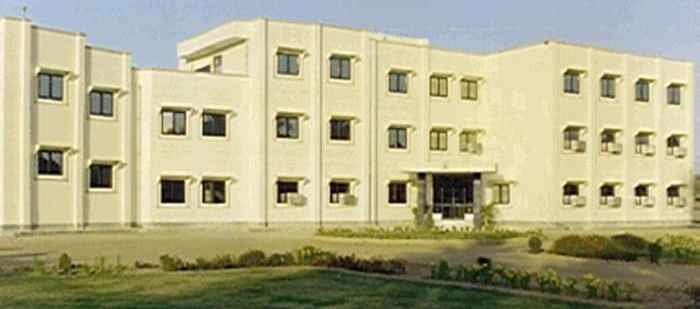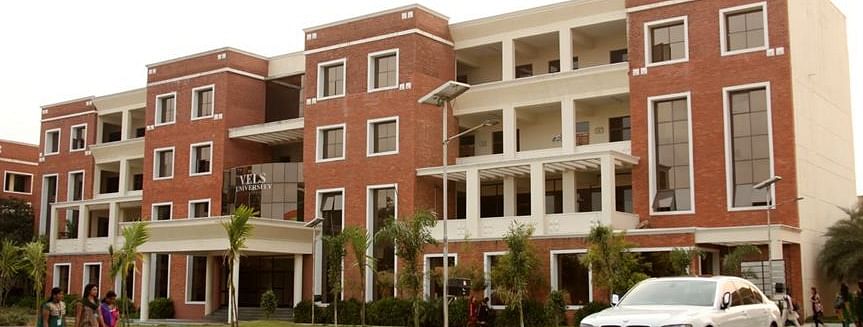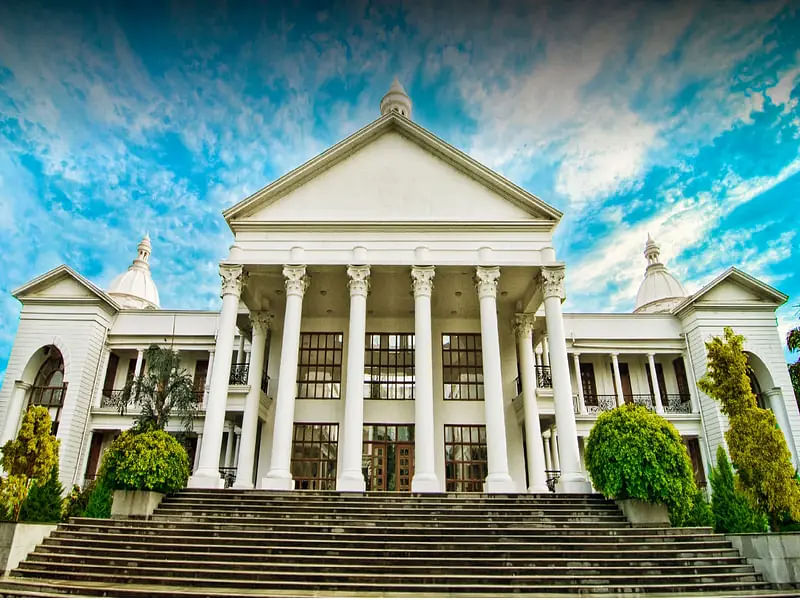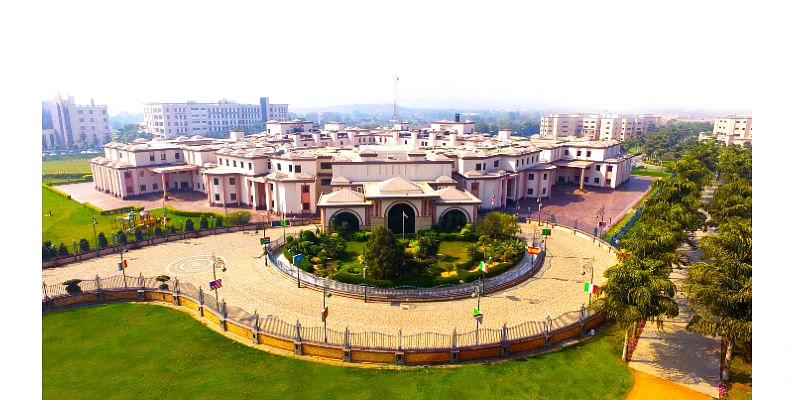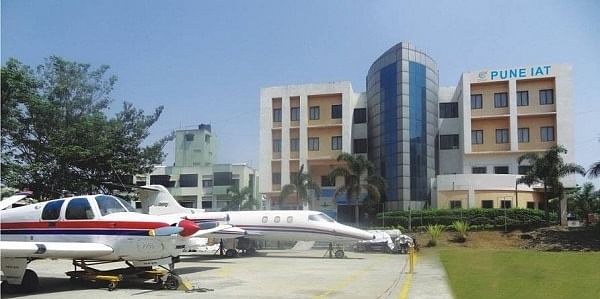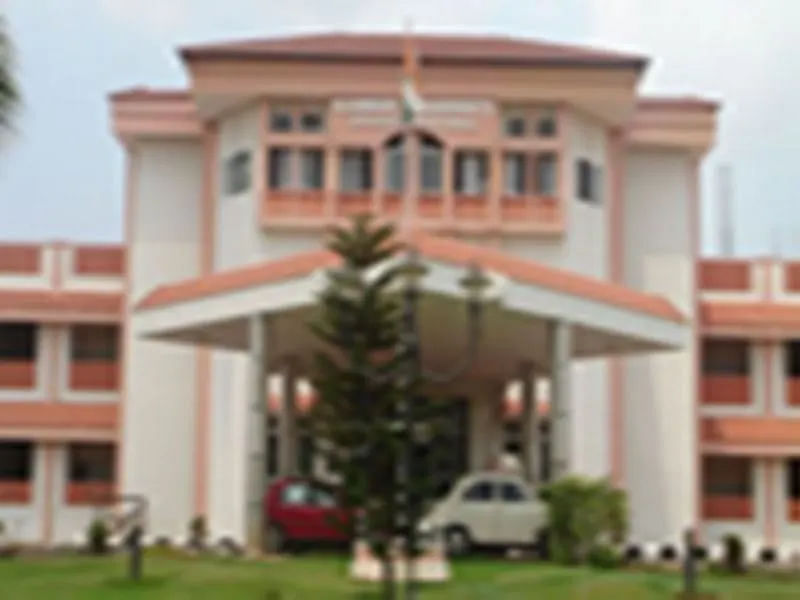BSc Aviation: Course Details, Eligibility, Fees, Admission, Duration
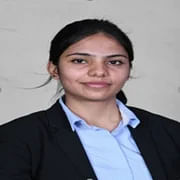
BSc Aviation is a three-year undergraduate course that focuses on technical elements of aviation, such as aerodynamics, aviation charts, and aircraft systems, which aid in their understanding of how airplanes function and navigate. The core BSc in Aviation subjects include aviation regulations, aircraft systems, aviation safety, flight planning, air traffic control, etc.
BSc Aviation eligibility requires candidates to clear their 10+2 (high school degree) in science or any related stream with a minimum of 50-55% marks or unreserved with 5% relaxation for SC/ST/PwD category from an accredited board. The admission is done only based on merit score. The average BSc Aviation fees is in the range of INR 17,000-3 LPA.
Table of Contents
- What is BSc Aviation Course?
- BSc Aviation Eligibility Criteria
- Why Choose a BSc Aviation Course?
- BSc in Aviation Admission
- Top B.Sc Aviation Colleges in India with Fees
- Types of B.Sc Aviation Courses
- BSc Aviation Syllabus and Subjects
- BSc Aviation vs BBA Aviation Management
- Salary of a BSc Aviation Graduate in India
- Courses After BSc in Aviation
- Career Options After Bachelor of Science in Aviation Course
- Skills to Excel as a BSc in Aviation Graduate
BSc Aviation Course Details
| Degree | Bachelors |
| Full Form | Bachelor of Science in Aviation |
| Duration | 3 Years |
| Age | The minimum age limit to enroll in the course is 17 years. |
| Subjects Required | Physics, Mathematics and English in 10+2 from a recognized board |
| Minimum Percentage | 50-50% aggregate in 10+2 examination for general category students and 5% relaxation for reserved category students. |
| Average Fees | INR 17,000-3 LPA |
| Average Salary | INR 2-5 LPA (Source: Ambition Box and Glassdoor) |
| Employment Roles | Aviation Analyst, Flight Operation Coordinator, Air Traffic Controller, etc. |
| Top Recruiters | SpiceJet, Go Airways, Air Indigo, IndiGo, etc. |
What is BSc Aviation Course?
The BSc Aviation course aims to teach students about knowledge and information about aircraft production and its maintenance, design, engine functionality, and aviation management. Top colleges like Vels University, Institute of Aviation and Aviation Safety, Mumbai University, etc., offer a BSc in Aviation course. The courses fall under the umbrella of BSc courses.
B.Sc Aviation curriculum helps students to gain an understanding of aircraft maintenance, flight planning, and other multiple facets of the aviation industry so they can work as Flight Dispatcher, Commercial Pilot, Safety Inspector, Cargo Operations Manager, etc. The average salary of a BSc Aviation graduate is INR 2-5 LPA ( Source: Ambition Box & Glassdoor).
BSc Aviation Eligibility Criteria
The admission procedure for BSc in Aviation requires candidates to fulfill a certain set of basic eligibility criteria including merit marks, subject requirements, etc. Below listed is the common BSc in Aviation eligibility criteria:
- The candidate should have completed 10+2 with Physics, Chemistry, Mathematics, and English as mandatory subjects with a minimum of 50-55% marks for the unreserved category and 5% relaxation for the reserved category.
- There are no entrance exams conducted for the admission process.
- The minimum age limit to enroll in the course is 17 years.
Why Choose a BSc Aviation Course?
BSc Aviation course is one of the dynamic courses, as there is a consistent demand for trained professionals in various roles, from pilots and air traffic controllers to aviation managers and safety experts. Below listed are reasons why one should choose BSc in Aviation course:
- The Indian Aviation Industry is projected to be the third largest in the world by the year 2043, leading to a higher demand for skilled professionals in the industry.
- As per the BLS Report, the demand for commercial pilots and other related toles in airlines is projected to have around 16,800 openings between the year 2022-2032.
- The demand for Aircraft Maintenance Engineer is projected to grow by 5% between the year 2016-2026.
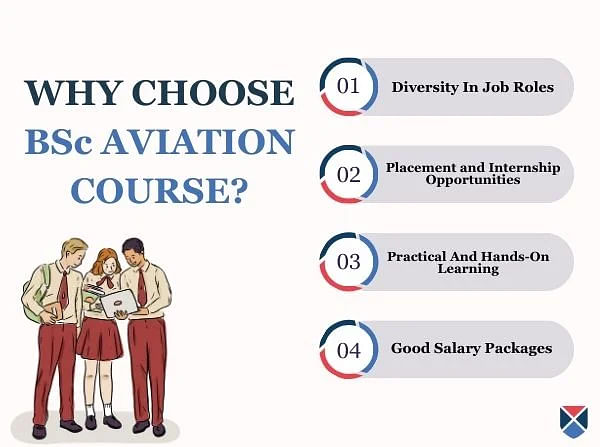
BSc in Aviation Admission
The BSc Aviation admission is done based on merit scores obtained by the students in colleges like Sathyabama Institute of Science and Technology, Hindustan University, etc. Below listed is the general B.Sc Aviation admission process:
- Step 1: The candidate should obtain the minimum percentage in their 12th examination for further admission process.
- Step 2: The student further needs to fill out the college application form either available online or offline.
- Step 3: As per the college admission criteria such as VELS University, the students are called for the PI process.
- Step 4: Once the college releases the merit list, the student needs to pay the fees and submit the necessary documents for verification.
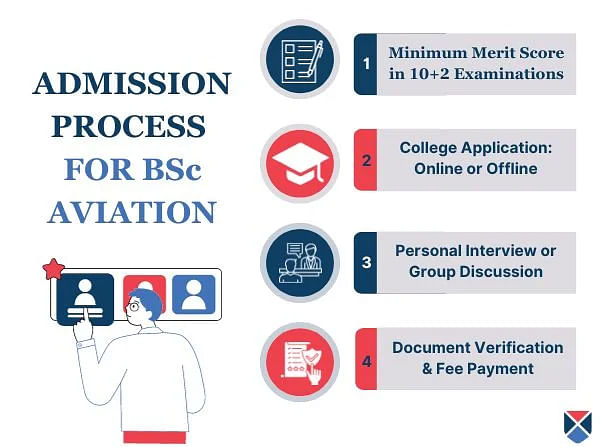
Top B.Sc Aviation Colleges in India with Fees
The average B.Sc Aviation fees in India is in the range of INR 17,000-3 LPA. Top colleges like VELS University, Hindustan University, ASET College, etc., offer BSc in Aviation courses. Below listed are the best colleges for BSc in Aviation course with their average fees:
|
Name of the College |
Average BSc in Aviation Fees |
|
INR 17,000 PA |
|
|
INR 57,500 PA |
|
|
INR 1.34 LPA |
|
|
INR 25,000 PA |
|
|
INR 20,000 PA |
|
|
INR 2.36 LPA |
|
|
- |
|
|
- |
|
|
Boston College, Madurai |
- |
|
ASET College |
- |
|
Institute of Aviation and Aviation Safety |
INR 66,000 PA |
Types of B.Sc Aviation Courses
The BSc Aviation course can be pursued in full-time and distance mode in India. Below listed are BSc Aviation course details:
|
Types |
BSc in Aviation Eligibility |
BSc Aviation Duration |
|
Full-Time BSc in Aviation |
10+2 (High School Degree) with a minimum of 50-60% marks for the general category and 45% marks for the reserved category students. |
3 Years |
|
BSc Aviation Distance Education |
10+2 (High School Degree) with a minimum of 45-50% marks for the general category and 45-40% marks for the reserved category |
3-5 Years |
Distance BSc Aviation Course
The distance BSc Aviation in India is recognized by UGC which offers students an understanding of the aviation industry with flexible learning and a cost-effective mode of study. A few crucial pointers for the distance learning BSc Aviation course are listed below:
- The distance BSc in Aviation colleges include IMTS Institute, Periyar University, etc.
- The average distance BSc Aviation fees in India is in the range of INR 20,000-35,000 PA.
- IGNOU also offers a similar course to students in aviation known as CAIS (Certificate in Airline In-Flight Service), with a duration of 6 Months.
- The course duration can be extended to five years, depending on the coursework completed by the student.
Also, Check: Aviation Courses after 12th
BSc Aviation Syllabus and Subjects
The first-year BSc Aviation syllabus gives an introduction to aviation, including its background, laws, and fundamental ideas. The second-year syllabus covers advanced topics like aircraft operations, aviation law and regulation, advanced aviation safety, etc. The third-year syllabus focuses on specializations like aviation management, aviation technology, aviation safety, aviation research, etc.
Below listed are a few important BSc Aviation subjects along with topics covered:
|
BSc Aviation Subjects |
Topics Covered |
|
Aircraft System |
Aircraft Structure and Materials, Electrical Systems, Fuel Systems, Landing Gear Systems, Aircraft Performance System, etc. |
|
Aerodynamics |
Airfoil Theory, Aerodynamic Control Surfaces, Wind Tunnel Testing, Compressibility and High-Speed Flight, etc. |
|
Aviation Safety |
Overview of Aviation Safety Principles, Safety Management Systems, Accident Investigation, Safety Audits and Inspection, etc. |
|
Flight Planning and Operations |
Flight Planning Process, Navigation and Airway Systems, Altitude and Airspeed Selection, Flight Monitoring, etc. |
Read More: B.Sc Aviation Syllabus and Subjects
BSc Aviation vs BBA Aviation Management
The technical aspects of aviation are the main focus of the BSc Aviation course, which gives students a thorough understanding of the design, maintenance, and operation of aircraft. The BBA Aviation Management program integrates business and aviation studies, including finance, marketing, etc.
The table below showcases the differences between a B.Sc in Aviation and BBA in Aviation Management:
|
Course |
BSc in Aviation |
BBA in Aviation Management |
|
Full Form |
Bachelor of Science in Aviation |
Bachelor of Business Administration in Aviation |
|
Course Overview |
The course curriculum focuses on topics like aviation technology, aircraft systems, and aviation safety. |
The course curriculum focuses on airline management, airport management, aviation marketing, or aviation finance |
|
Stream |
Science |
Management/Commerce |
|
Duration |
3 Years |
3 Years |
|
Eligibility |
10+2 (High School Degree) with a minimum of 50-55% marks. |
10+2 (High School Degree) with a minimum of 50% marks. |
|
Entrance Exams |
On Basis of Merit Score |
CUET-UG, UPESET, SUAT, etc. |
|
Top Colleges |
ASET College, Hindustan University, Vels University, etc. |
UPES, Silver Oak University, NIILM University, etc. |
|
Fees |
INR 17,000-3 LPA |
INR 20,000-2 LPA |
|
Average Salary |
INR 2-5 LPA |
INR 2.50-4 LPA |
|
Job Role |
Aviation Analyst, Aerospace Researcher, Aviation Consultant, etc. |
Airline Manager, Airline Operations Coordinator, Aviation Marketing Manager, etc. |
Salary of a BSc Aviation Graduate in India
The BSc Aviation salary in India on average is between INR 2-5 LPA (Source: Ambition Box & Glassdoor). Graduates after having three-plus years of experience can earn more than INR 7 LPA. Below listed are job roles for BSc in Aviation graduates along with their average entry-level salaries:
|
BSc Aviation Jobs |
Entry Level Average Salary |
Salary After 3 Years of Experience |
|
Aircraft Maintenance Engineer |
INR 3.20 LPA |
INR 4-8 LPA |
|
Cabin Crew |
INR 3 LPA |
INR 6.20-7 LPA |
|
Airport Security Officer |
INR 4.40 LPA |
INR 6-9 LPA |
|
Flight Training Instructor |
INR 3-4 LPA |
INR 6-8.40 LPA |
Read More: BSc Aviation Salary in India
Courses After BSc in Aviation
Graduates with a BSc in Aviation can continue their education by enrolling in additional certification courses or higher education programs, which will further develop their subject knowledge and skills. A few courses that a graduate of the B.Sc. Aviation programs can pursue further are listed below:
- MSc in Aviation
- MBA in Aviation Management
- PhD in Aviation
- Aircraft Maintenance License Certification
- MSc in Air Transport Management
- PG Diploma in Aviation Law
Career Options After Bachelor of Science in Aviation Course
The career options after BSc in Aviation are vast, graduates can work in top airlines including Vistara, Air India, TruJet, GoAir, Air Asia India, etc. Below listed are a few BSc Aviation job roles offered to graduates along with their job designation, top companies, and average starting salaries:
|
Job Designations |
Hiring Companies |
Average Salary |
|
Aviation Analyst |
SpiceJet, Jet Airways, IndiGo, RDM India, etc. |
INR 4.10 LPA |
|
Air Traffic Controller |
TCS, Collabera, Magicbricks, SpiceJet, AAI, etc. |
INR 4.82 LPA |
|
Aircraft Dispatcher |
Jet Airways, IndiGo, Air India, Air Asia, Global Vectra HeliCorp, etc. |
INR 5.52 LPA |
|
Airline Customer Service Representative |
IndiGo, AirBus, AISATS, Air India, Alliance Air, etc. |
INR 2.48 LPA |
|
Aviation Consultant |
ICF, Air India, CAPA India, Laminaar Aviation Infotech, etc. |
INR 3.5-5 LPA |
Top Recruiters for BSc in Aviation Graduates
The B.Sc Aviation graduates are hired by various private and government airlines, aviation training and education institutes, aviation consulting firms, aviation research and development departments, etc. Below listed are a few top recruiters for graduates:
|
Top Recruiter |
BSc Aviation Monthly Salary (Average) |
|
Go First |
INR 30,833 |
|
Vistara |
INR 40,000 |
|
Tata Lockheed Martin Aerostructures |
INR 30,000 |
|
Hindustan Aeronautics |
INR 27,000-INR 45,000 |
|
DRDO |
INR 26,000 |
[Source: Glassdoor & Ambition Box]
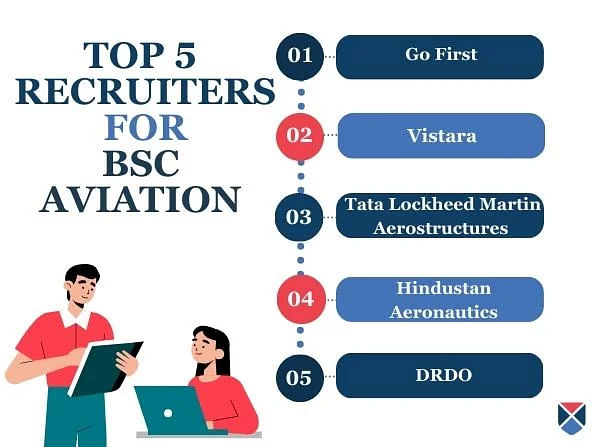
Skills to Excel as a BSc in Aviation Graduate
To excel as a BSc Aviation graduate a combination of domain knowledge, technical knowledge, and practical skills are required. Below listed are a few skills required by the graduate:
- Aircraft Knowledge: The individual should understand aircraft terms, components, systems, and operations.
- Flight Planning Skills: The graduate should be able to understand flight routes, read aviation charts, and understand navigation systems.
- Communication Skills: The graduate should have good verbal and written communication skills to collaborate with crew members, ground staff, air traffic controllers, and customers.
- Technological Proficiency: The graduate should be well-equipped with aviation software and flight management systems for the smooth flow of the process.
- Customer Handling: The graduate should have a customer-centric mindset to provide the best passenger and flight experience from their onboarding to final destination arrival.
Top BSc Aviation Colleges
Top Aviation Entrance Exams
BSc Aviation Fee Structure
FAQs on BSc Aviation
Q: Is BSc Aviation a good career?
Q: Are there any specialization subjects available in the BSc Aviation course?
Q: Can I pursue BSc Aviation after 12th?
Q: Can I work with commercial airlines after completing BSc in Aviation?
Q: What are the top private BSc in Aviation colleges in India?
Q: Is it possible to become a pilot after completing a BSc in Aviation?
